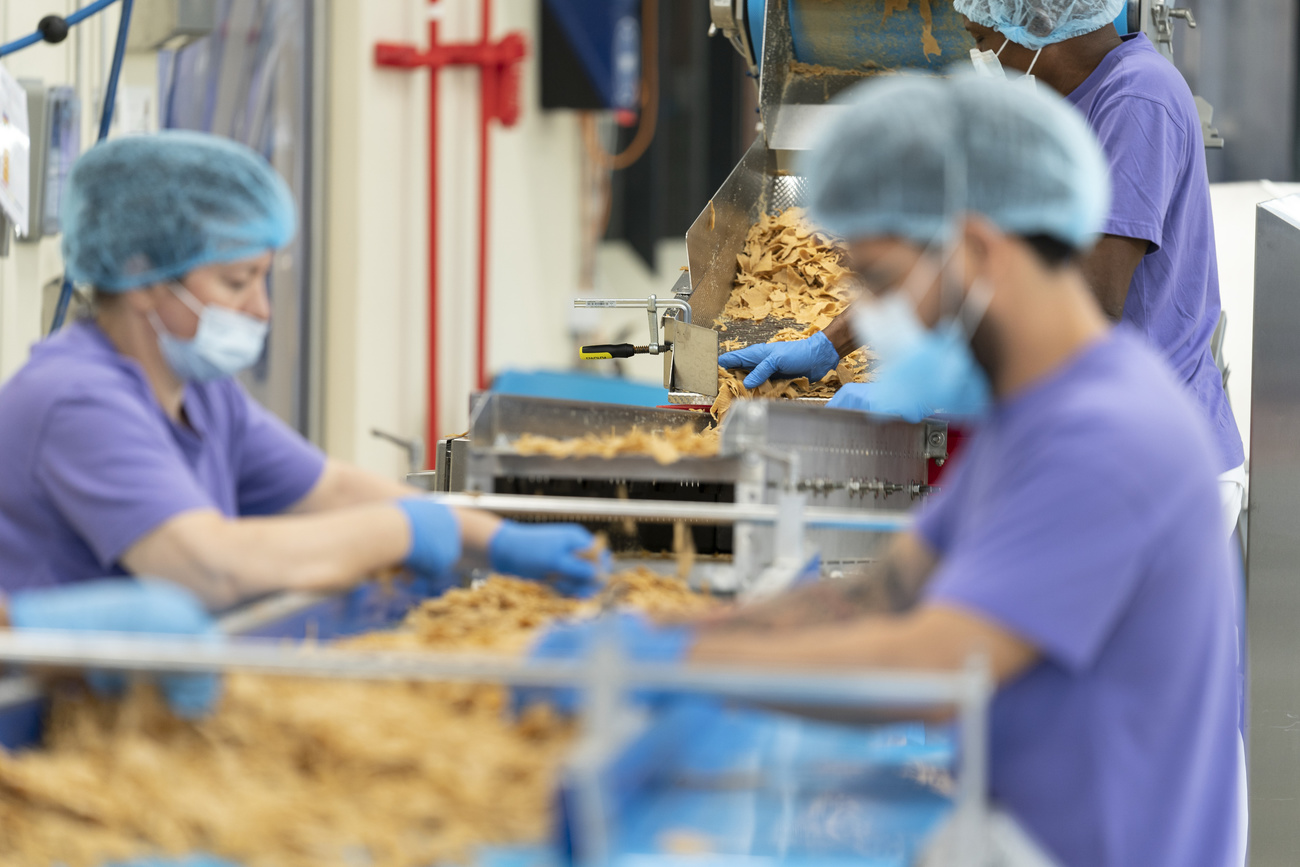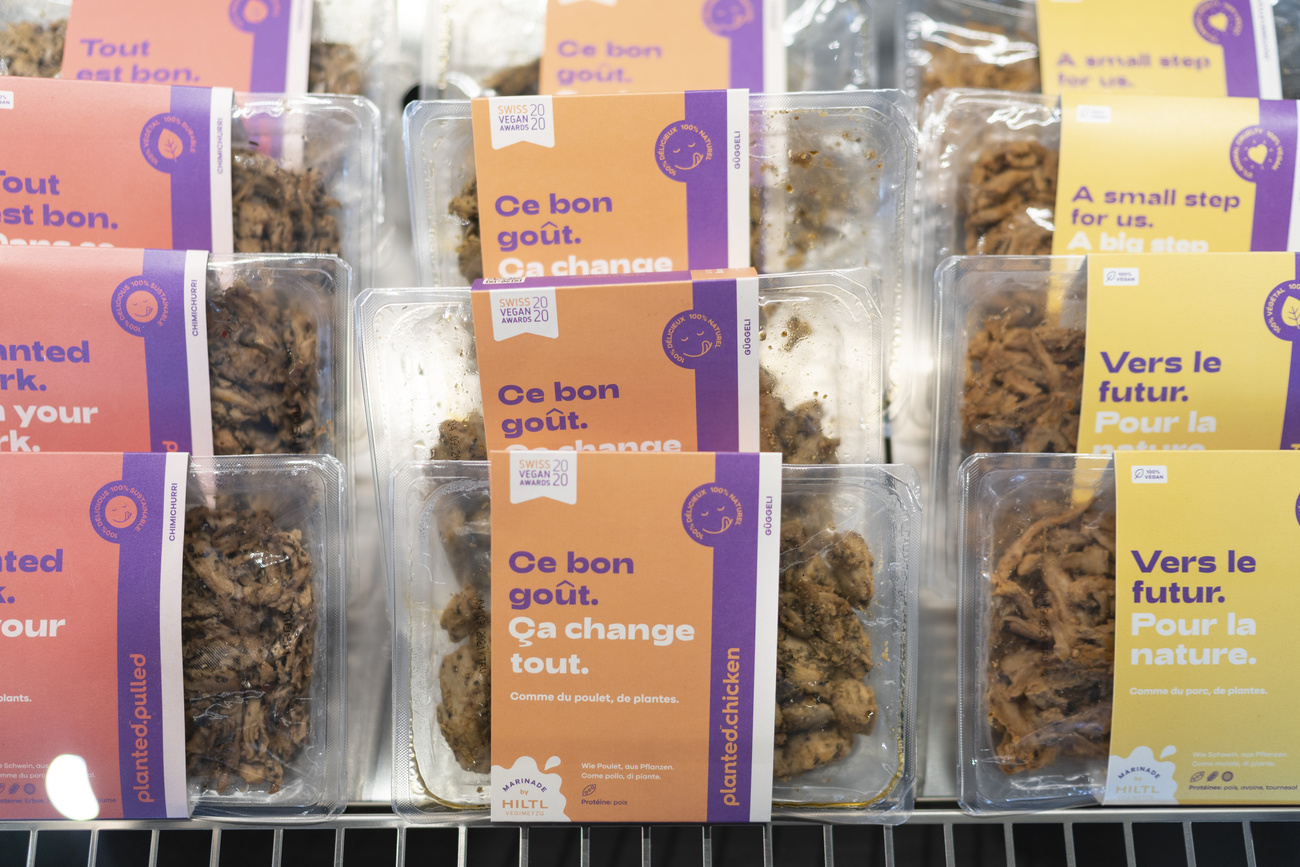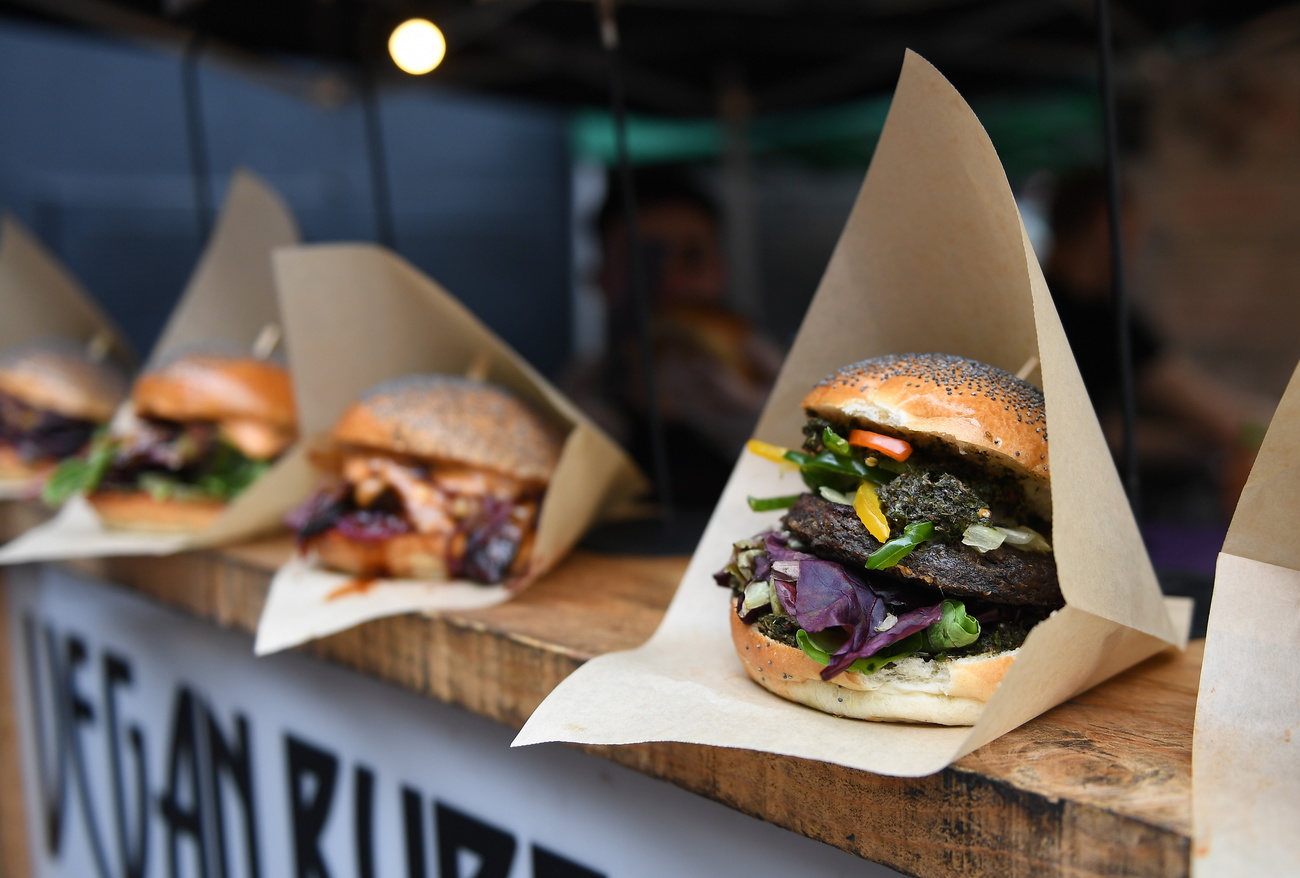
‘The meat industry is our main competitor’

While its vegetarian substitutes for meat are still niche products, the Zurich-based start-up Planted is targeting strong international growth. The company is working to improve its range and lower its prices in order to win over the general public.
With its “vegetable meat”, Planted is riding high. Last September the young start-up managed for the third year in a row to finish on the podium of the TOP 100 Swiss Startup AwardExternal link, which recognises the most promising start-ups in the country.
In September 2022 the company raised CHF70 million ($80 million) in investment funding, to add to the CHF35 million from its first round of fundraising the year before. Now in its fourth year of existence, Planted employs more than 200 people and its products are sold all over Europe.
The market for plant-based alternatives to meat is growing rapidly, as more and more people choose to reduce their consumption of meat products against the backdrop of the climate crisis and an increased concern for animal wellbeing. In SwitzerlandExternal link as elsewhere in EuropeExternal link, research shows a strong increase in demand for products of this kind.
Born in Germany, Judith Wemmer studied at the federal technology institute ETH Zurich. She gained her doctorate in 2019 in food processing engineering. She has worked as a student assistant, post-doc researcher and lecturer at the same university.
In February 2020 she joined the Planted Foods team and in August of that year she joined the executive board as one of its four members. She is in charge of product development, operations, regulatory issues and intellectual property.
Wemmer is also president of the Swiss Protein Association.
Planted doesn’t have a CEO; it is run by an executive board made up of four members, one of whom is Judith Wemmer. SWI swissinfo.ch met her at the company’s headquarters in the Kemptthal industrial estate in the Zurich countryside.
SWI swissinfo.ch: Plant-based alternatives to meat currently represent only 1% to 2% of the food market. What kind of development do you expect in this sector?
Judith Wemmer: At this stage it’s mainly the early adopters who are buying our products, as was the case with the initial clients of Tesla [maker of electric cars] 15 years ago.
These pioneering customers appreciate innovative products, although the prices are still high and their quality can be improved.
After that, a period of vigorous growth will follow. But first we must continue to improve the quality of our products, for example by fine-tuning the fermentation processes.
Furthermore, we have to diversify our range and lower our prices, by achieving economies of scale in the production process.
SWI:A lot of plant-based alternatives to meat are ultra-processed products, associated with an increased risk of disease, in particular different forms of cancer. Can Planted avoid this pitfall?
J.W.: Our production process is similar to that for making bread or pasta: we follow a series of steps meticulously to make our vegetarian meat. All our ingredients are natural and additive-free.
Our bodies do not need specific foods, they need to absorb certain elements. We make sure that our products have a high concentration of proteins, fibre and micronutrients, and are low on saturated fats and sugar.
Consequently, our production process doesn’t lead to the typically unhealthy products high in calories associated with the term “ultra-processed”. Our foodstuffs are created to correspond perfectly with a healthy and sustainable diet.
SWI: Nutritionists say that plant proteins are not exactly the same as animal proteins. Does Planted work towards optimising the nutritional properties of its products?
J.W.: Our main objective is to preserve the nutritional integrity of our product through each step in the production process. That’s why we don’t use any additives. The presence of essential minerals, such as iron, in our products is perfectly natural.
Whatever their origin, all proteins have the same components, called amino acids. Planted provides all the essential amino acids. Legumes like peas are in general rich in amino acids such as lysine, leucine and phenylalanine but rather poor in methionine and cysteine.
Vegetable proteins are best obtained by combining legumes, seeds and cereals. So, the ideal thing to do is to eat our products together with some rice, pasta or bread and so on.

SWI: Which distribution channels do you have?
J.W.: We sell online to everywhere in Europe. Our foods are also sold in eight European countries by restaurants and retailers, including Migros and Coop in Switzerland and Tesco in the UK.
We have established several partnerships. One of these is our agreement with Fleury Michon, a French firm specialising in charcuterie, through which we sell three sorts of thinly sliced vegetable products.
In order to support our international growth, we have established trade offices in Austria, France, Germany, Italy and the UK.

SWI: Are you already making money?
J.W.: We aren’t profitable yet. We could be, but we prefer to continue developing and investing, especially in research and in production tools.
SWI: Who are your main competitors?
J.W.: First and foremost the meat industry. Other start-ups from Switzerland and abroad are also operating in our field, but most of them focus on marketing and distributing products bought from external producers.
Multinationals like Nestlé and Unilever are also showing an interest in plant-based foodstuffs.
In any case, the market for food products is immense and so there must be room for a multitude of different actors.
SWI: Oatly, the Swedish leader for plant-based substitutes for dairy products, is facing several challenges: global growth, high costs, production issues. How can you avoid a similar situation?
J.W.: We are focused on our products, our innovation and the building of a solid Swiss company, not on how other companies are rated by the press and analysts.
In any case, our very strong growth in Switzerland and abroad encourages us to stick to our path with determination.
SWI: The production of vegetable protein generates 40 times less carbon dioxide than that of animal protein. Do governments reward your engagement with the climate issue?
J.W.: Absolutely not, whereas a business like Tesla generates large profits through selling “carbon credits” to traditional carmakers.
In the political arenas, meat-based products are supported by a powerful lobby… Besides, we would need to demonstrate in detail that our products are just as nutritious as those of the meat industry.
Finally, the present attitude is not to intervene through tax policies to influence people’s food choices.
SWI: Are you planning to start production abroad to lower costs and facilitate your logistics?
J.W.: In the future we will certainly produce abroad, in fact we are looking for a potential location in Europe.
Of course, we will always keep part of our production in Kemptthal in order to enhance the cooperation with our research and development departments.
Edited by Samuel Jaberg and Pauline Turuban. Translated from French by Johannes Waardenburg

More
Consumption of meat alternatives booms

In compliance with the JTI standards
More: SWI swissinfo.ch certified by the Journalism Trust Initiative



























You can find an overview of ongoing debates with our journalists here . Please join us!
If you want to start a conversation about a topic raised in this article or want to report factual errors, email us at english@swissinfo.ch.